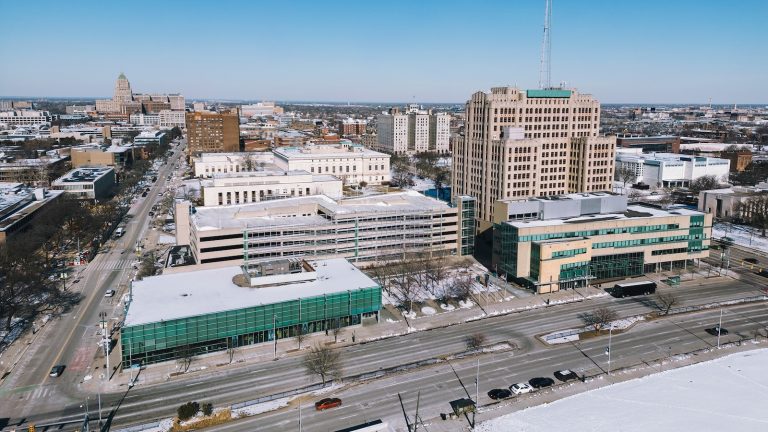International students pursuing degrees at Michigan public universities sought relief from detention and deportation during a federal court hearing on Tuesday, after their student immigration status was terminated this month, jeopardizing their legal status in the U.S.
The students — two citizens of China, one of Nepal and another from India — filed a lawsuit on Friday against the Department of Homeland Security (DHS) and immigration officials, claiming that their student immigration status in the Student and Exchange Visitor Information System (SEVIS) was illegally terminated “without sufficient notice and explanation.”
SEVIS is a database that tracks information about nonimmigrant students and exchange visitors in the U.S.
“According to the government, they no longer have legal status in the U.S., and they have to leave the country immediately,” Ramis Wadood, an attorney with the American Civil Liberties Union (ACLU) of Michigan who is representing the students, told ABC News.
He noted that the students didn’t get any kind of grace period.
“You no longer have status, and have to leave the country right away,” Wadood said.
The complaint was filed in the U.S. District Court by the ACLU of Michigan on behalf of the students — Xiangyun Bu, Qiuyi Yang, Yogesh Joshi and Chinmay Deore. According to the complaint, in addition to their student immigration status being terminated, Yang and Joshi were told that their F-1 student visas, which allowed them to enter the country, were also revoked.
“None of them has been charged with, let alone convicted of, any crime in the United States,” the complaint said. “None has violated any immigration law. Nor have they been active in on-campus protests regarding any political issue.”

Aerial of downtown Detroit, Michigan
Pawel.gaul/Getty Images
The students’ attorneys argued during a Tuesday morning hearing in a Detroit federal court for a temporary restraining order that would restore their legal status and protect them from arrest or deportation as the case moves forward.
According to Wadood, the judge indicated that he “recognized the urgency of the situation and said he would rule soon.”
Wadood told ABC News on Monday that his clients are at risk of being arrested by Immigration and Customs Enforcement (ICE) and are “scared” and have stopped showing up to classes in person.
“Our clients have been allowed to continue their studies to the extent that their professors and their programs will accommodate,” Wadood said, adding that they are trying to resume their studies remotely since “they’re at risk of arrest and detention at any point.”
The lawsuit names DHS Secretary Kristi Noem, acting ICE Director Todd Lyons and ICE Detroit Field Office Director Robert Lynch. ABC News reached out to the officials but requests for comment were not immediately returned.
“DHS did not provide the students or their schools any meaningful explanation for terminating their F-1 student status,” the complaint said. “At most, what seems to connect students targeted by this newfound and unlawful policy is that the students had some encounter with some American law enforcement official at some point in the past, no matter how innocuous — including receiving a speeding or parking ticket (or even a warning) or lawfully withdrawing an application to enter the United States.”

Secretary of Homeland Security Kristi Noem speaks at the Border Security Expo at the Phoenix Convention Center in Phoenix, Arizona, April 8, 2025.
Rebecca Noble/POOL/AFP via Getty Images
Court records show four separate letters that each of the students received from their prospective universities informing them that their student immigration status has been terminated. The reason cited by DHS in all cases is “individual identified in criminal records check,” and for Yang and Joshi it also says “and/or revoked visa.”
The Trump administration filed a response on Monday evening to the plaintiff’s motion for a temporary restraining order, urging the judge to “deny this request because it is procedurally and substantively improper.”
“An emergency motion for a temporary restraining order may only be used to maintain the status quo; it cannot be used to obtain the ultimate relief plaintiffs seek in this case, which is the alteration of their SEVIS record,” it said.
The government also alleged in Monday’s filing that the students have criminal records, but did not provide additional details.
“DHS searched criminal records for each of the plaintiffs and criminal history matches were returned for each of the plaintiffs,” its response said.
Wadood denied that any of his clients have ever been charged with or convicted of a crime. He said that in explaining their reference to “criminal records,” the government cited three of his clients who were detained for alleged domestic disputes.
They were subsequently released and not charged with any crimes, while one plaintiff “doesn’t have as much as a simple speeding ticket or parking ticket” on their record, according to Wadood
“Our plaintiffs’ criminal history is clean. They have no convictions, no charges,” he said.

Secretary of State Marco Rubio listens as President Donald Trump meets with El Salvador’s President Nayib Bukele in the Oval Office of the White House in Washington, DC, April 14, 2025.
Brendan Smialowski/AFP via Getty Images
The federal lawsuit comes as the Trump administration’s immigration crackdown strikes higher education, prompting a slew of lawsuits against White House officials. Similar lawsuits have been filed across the country in states like New Hampshire, Indiana and California.
According to Inside Higher Ed — a publication that tracks news in higher education — as of Tuesday over 180 colleges and universities have identified nearly 1,200 international students and recent graduates who have had their legal status changed by the State Department.
“If the courts don’t put an end to this arbitrary government action, then generations of future international students are going to see what’s happening today and decide, ‘You know what, it’s probably not safe for me to go to the U.S to study'” Wadood said. “And our academic institutions, our academic communities, are going to be so much worse off because of it.”
The Trump administration appears to be targeting some international students with student visas and green card holders for their participation in pro-Palestinian protests on college campuses or for alleged criminal records.
“A visa is a gift. It’s a voluntary thing. We decide to give you a visa,” Secretary of State Marco Rubio said during a March 28 press conference. “We deny visas all over the world every day for a variety of reasons, and that means we can also revoke those visas. No one is entitled to a visa.”



